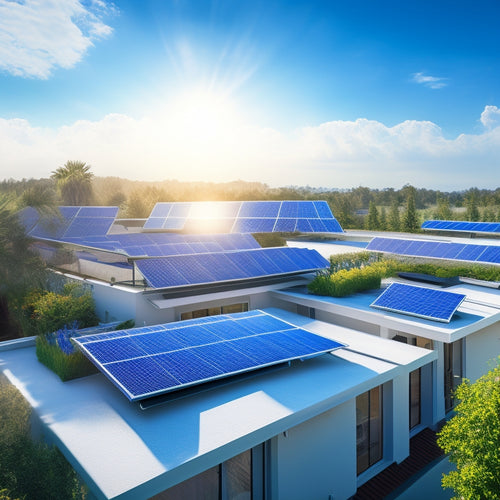
What's the Average Cost of Residential Solar Panels for Your Home?
Share
You can expect to pay between $15,000 and $30,000 for a residential solar panel system, with the actual cost varying based on system size, equipment quality, and installation company. Larger systems generally incur higher costs due to increased equipment and labor requirements, while high-efficiency panels come at a premium compared to standard panels. Local incentives like government rebates and tax credits can greatly reduce overall costs. As you consider investing in solar panels, it's crucial to weigh these factors to determine the best fit for your home and budget - and there's more to investigate to guarantee you make an informed decision.
Key Takeaways
- The average cost of residential solar panels ranges from $15,000 to $30,000, depending on system size and equipment quality.
- Larger systems generally incur higher costs due to increased equipment and labor requirements, but provide greater energy independence and output.
- High-efficiency panels come at a premium compared to standard panels, but offer greater long-term benefits and energy savings.
- Local incentives, such as government rebates and tax credits, can significantly reduce overall costs and enhance the value of solar investments.
- Approximately 80% of the total solar panel system cost is attributed to the panels themselves, with the remaining 20% covering installation and other expenses.
Understanding Solar Panel Costs
When considering solar panels for your home, understanding the costs involved is vital to making an informed decision. The initial investment in solar panels can be significant, but it's important to look beyond the upfront cost.
With solar financing options available, you can spread the expense over time, making it more manageable. Furthermore, the long-term benefits of solar panels, including reduced energy bills and a lower carbon footprint, can lead to significant savings.
As you weigh the costs, remember that solar panels have a significant environmental impact. By utilizing renewable energy, you're reducing your reliance on fossil fuels and contributing to a cleaner, healthier environment. This not only benefits your community but also future generations.
Additionally, many governments offer incentives for homeowners who invest in solar energy, which can help offset the initial cost. By understanding the costs involved and considering the broader benefits, you can make an informed decision that's good for your wallet and the planet.
Factors Affecting Solar Panel Prices
When you're pricing out residential solar panels, you'll quickly realize that several factors impact the final cost.
You'll need to evaluate the system size you require, the quality of the panels you want, and the complexity of the installation process.
These variables will greatly influence the overall price of your solar panel system.
System Size Matters
How much will you need to invest in your solar panel system? The answer largely depends on the size of the system you require. A larger system will generally cost more, but it will also provide more energy independence.
The size of your system is directly tied to your energy needs, which are influenced by factors like your home's energy efficiency, the number of people living in your home, and your energy usage patterns.
A larger system doesn't always mean it's more efficient, though. System efficiency is also essential in determining the cost. A more efficient system can generate more power with fewer panels, which can reduce the overall cost.
To determine the right system size for you, consider your energy goals and the amount of roof space available for installation. A solar panel professional can help you assess your energy needs and design a system that meets your goals for energy independence.
Panel Quality Varies
Beyond system size, the quality of your solar panels plays a considerable role in determining the overall cost of your residential solar panel system. You may think that all solar panels are created equal, but that's not the case. The quality of your panels can greatly impact your energy output and savings.
Here are some factors that affect panel quality and cost:
-
Panel Efficiency: High-efficiency panels produce more energy per hour of sunlight, resulting in higher upfront costs but greater long-term savings.
-
Warranty Options: Look for panels with extensive warranties that cover performance, materials, and workmanship for 25 years or more.
-
Durability and Build Quality: High-quality panels are built to last, with durable materials and strong construction that can withstand harsh weather conditions.
- Certifications and Compliance: Confirm your panels meet industry standards and certifications, such as UL certification and compliance with local building codes.
When it comes to panel quality, you get what you pay for. Investing in high-quality panels may cost more upfront, but it can lead to greater energy savings and a longer system lifespan.
Installation Complexity
Your solar panel system's installation complexity is another significant factor affecting its overall cost. The more complex the installation, the higher the cost. Several factors contribute to installation complexity, including:
| Factor | Description | Impact on Cost |
|---|---|---|
| Roof Suitability | Steep, multi-angled, or irregularly shaped roofs require more labor and equipment | High |
| Labor Availability | Availability of skilled labor in your area affects labor costs | Medium |
| Weather Conditions | Inclement weather, such as heavy rain or extreme temperatures, can slow down installation | Low |
| Installation Timeline | Rushed installations or tight deadlines can increase labor costs | Medium |
| Equipment Choices | High-efficiency panels or custom installations require more complex equipment | High |
Moreover, installation permits, local regulations, and installation warranties can also impact the overall cost. For instance, obtaining necessary permits can add to the cost, while local regulations may require additional equipment or labor. In addition, installation warranties can provide peace of mind but may increase the upfront cost. By understanding these factors, you can better estimate the cost of your solar panel system and make informed decisions about your installation.
Average Cost of Solar Panels
With the rising demand for clean energy, understanding the average cost of solar panels is vital for homeowners looking to harness the power of the sun.
As you consider making the switch to solar, it's important to have a clear understanding of the upfront costs involved.
On average, the cost of solar panels for a typical residential solar panel system ranges from $15,000 to $30,000.
However, the actual cost can vary depending on several factors, including the size of your system, the quality of the equipment, and the installation company you choose.
Here are four key factors that can impact the average cost of solar panels:
- System size: The larger the system, the more expensive it will be.
- Panel quality: High-efficiency panels cost more than standard panels.
- Installation company: Different companies have varying prices for their services.
- Local incentives: Government rebates and tax credits can reduce the overall cost.
Cost Breakdown for Residential Solar
When you're considering residential solar, you'll find that the cost varies greatly depending on the system size, panel quality, and installation costs.
You'll need to factor in that a larger system requires more equipment and labor, while high-efficiency panels come at a premium.
System Size Matters
The size of a residential solar panel system plays a significant role in determining its overall cost. As you contemplate investing in solar energy, you'll want to think about the size of the system that's right for your home. A larger system will naturally cost more, but it will also provide more power and increase your energy independence.
Here are some key factors to reflect on when determining the size of your system:
-
Your energy usage: How much energy do you currently use, and how much do you want to offset with solar power?
-
Roof size and space: How much space do you have available on your roof for solar panels?
-
Local building codes and regulations: Are there any restrictions on the size of solar panel systems in your area?
- Financing options: How much are you able to invest upfront, and what financing options are available to you?
Panel Quality Varies
About 80% of the total cost of a residential solar panel system comes from the solar panels themselves, making panel quality a critical factor in determining the overall cost of your system.
You'll want to evaluate the trade-offs between panel efficiency, warranty options, and upfront cost. High-efficiency panels may cost more, but they can generate more power per hour of sunlight, making them a good choice for homes with limited roof space. On the other hand, lower-efficiency panels may be more budget-friendly but require more space to produce the same amount of power.
When assessing panel quality, look for manufacturers that offer extensive warranty options, such as 25-year performance guarantees and 10-year product warranties. These warranties can provide peace of mind and protect your investment in case something goes wrong.
Additionally, evaluate panels certified by reputable organizations like UL (Underwriters Laboratories) or IEC (International Electrotechnical Commission), which guarantee the panels meet certain safety and performance standards.
Installation Costs Differ
In addition to panel quality, installation costs greatly impact the overall expense of a residential solar panel system.
As you contemplate investing in solar energy for your home, it's crucial to understand the various factors that influence installation costs.
These costs can vary considerably depending on several factors, including:
-
Labor costs: The cost of hiring experienced professionals to install your solar panel system can differ depending on your location and the complexity of the installation.
-
Permitting and inspection fees: Fees for obtaining necessary permits and undergoing inspections can add up, and these costs vary by region.
-
Mounting and tracking system: The type of mounting system used to secure your solar panels can impact the overall installation cost. Tracking systems that adjust to maximize energy production are typically more expensive.
- Electrical infrastructure upgrades: If your home's electrical system requires upgrades to accommodate the solar panel system, these additional costs will be factored into the installation cost.
When exploring financing options for your solar panel system, be sure to take these installation costs into account and factor in ongoing maintenance expenses to guarantee a clear understanding of the total cost of ownership.
System Size and Cost Correlation
As you investigate the world of residential solar panels, understanding the correlation between system size and cost becomes essential for making informed decisions. The larger the system, the more energy it produces, and the higher the upfront cost.
However, a larger system doesn't always mean it's more efficient. System efficiency, which is measured by the amount of energy produced per unit of surface area, plays a considerable role in determining the cost-effectiveness of your solar panel system.
When it comes to energy production, a larger system typically generates more electricity, but it also increases the overall cost. To put this into context, a 5-kilowatt system may produce 6,000 kilowatt-hours of electricity per year, while a 10-kilowatt system may produce 12,000 kilowatt-hours.
However, the cost of the 10-kilowatt system would be notably higher than the 5-kilowatt system. As you weigh your options, consider your energy needs and budget to determine the best system size for your home.
Installation Costs and Labor Fees
Every installed solar panel system requires a team of professionals to secure a safe and efficient setup, and their labor fees can add up quickly. As you consider going solar, it's crucial to factor in these installation costs and labor fees to get an accurate estimate of the overall expense.
Here are some factors that can impact your installation costs and labor fees:
-
Permitting and inspections: You'll need to acquire permits from your local government, which can cost around $500 to $1,000. Inspections may also be required, adding to the overall cost.
-
Roofing and structural assessments: If your roof needs repairs or replacement, this can contribute to the overall cost of installation.
-
Electrical and wiring upgrades: Your electrical system may need to be upgraded to accommodate the solar panel system, which can increase labor fees.
- Mounting and tracking systems: The type of mounting and tracking system you choose can affect installation costs, with more complex systems requiring more labor and materials.
When exploring financing options, consider factoring in maintenance expenses to guarantee you're prepared for any future repairs or replacements.
Incentives and Rebate Programs
Your solar panel investment can pay off in more ways than one, thanks to various incentives and rebate programs available.
These benefits can greatly reduce the upfront cost of your solar panel system, making it more affordable and increasing your return on investment. You can take advantage of federal incentives, such as the Solar Investment Tax Credit (ITC), which allows you to claim a tax credit of up to 26% of the total cost of your solar panel system.
Additionally, many states offer rebates and tax credits for residential solar installations. Local programs may also provide installation grants, low-interest financing options, or other incentives to encourage the adoption of solar energy.
By combining these incentives, you can maximize your energy savings and environmental benefits while minimizing your out-of-pocket expenses.
With the right combination of incentives, you can enjoy a faster payback period and start reaping the rewards of your solar panel investment sooner.
Long-Term Solar Panel Savings
Most households can expect to save hundreds of dollars on their electricity bills annually once they've installed a solar panel system. This is because solar panels generate free electricity, reducing your reliance on the grid and subsequently lowering your energy costs.
Over time, these savings can add up, providing significant long-term financial benefits.
Here are some ways you can benefit from long-term solar panel savings:
-
Lower Electricity Bills: Solar panels can save you money on your electricity bills, with the average homeowner saving around $400-$1,000 per year.
-
Increased Property Value: Installing solar panels can increase your property value, making your home more attractive to potential buyers if you decide to sell in the future.
-
Low Maintenance Costs: Solar panels require very little maintenance and are designed to last for 25 years or more, reducing the need for costly repairs or replacements.
- Hedge Against Rising Energy Costs: As energy prices continue to rise, your solar panels will provide a stable source of energy, protecting you from increasing electricity costs.
Frequently Asked Questions
Can I Install Solar Panels on a Rented Property?
You can investigate installation options for solar panels on a rented property, but it's vital to get your landlord's permission first; look into renter incentives, like community solar programs or portable solar systems, to make it happen.
Do Solar Panels Work During Power Outages?
You're wondering if solar panels will keep your lights on during a power outage - surprisingly, they typically won't, but you can invest in a battery backup system to guarantee continuous solar panel functionality and reliable power outage solutions.
Are Solar Panels Durable in Extreme Weather Conditions?
You'll be relieved to know that solar panels are built to withstand extreme weather conditions, with a typical solar panel lifespan of 25-30 years, and many manufacturers testing their products for extreme weather resilience, ensuring your investment stands the test of time.
Can I Sell Excess Energy Back to the Grid?
You can sell excess energy back to the grid through net metering benefits and energy buyback programs, offsetting your energy costs and even earning credits, giving you a sense of community and contribution to a sustainable future.
Do Solar Panels Increase My Property Value?
You're likely to see a significant increase in property value with a solar investment, as a property appraisal will reflect the increased worth, making your home more attractive to potential buyers and increasing its resale value.
Conclusion
As you weigh the decision to go solar, remember that the upfront cost is just the starting point. Think of it like planting a tree - the initial investment may seem steep, but as the years go by, it will grow and flourish, providing shade and savings for decades to come. In fact, according to the US Department of Energy, the average American family can save $400 to $1,000 per year on their electricity bill with solar panels.
Related Posts
-

Why You Need a Phone Mount for Navigation
When you're on the road, a reliable phone mount is not just a convenience, it's a safety necessity that helps you mai...
-

Safety First: Why Seniors Need Advanced Vehicle Features
As you get behind the wheel, you're likely unaware that seniors are 16% more likely to be involved in a fatal car cra...
-

Best Solar Panel Options for Maximum Energy Savings
You can maximize your energy savings with solar panels that boast efficiency ratings above 20%, paired with extensive...


